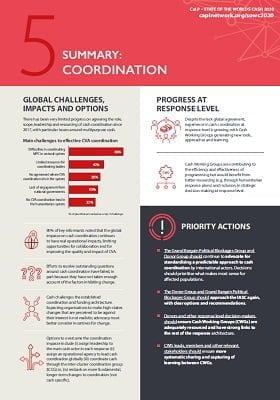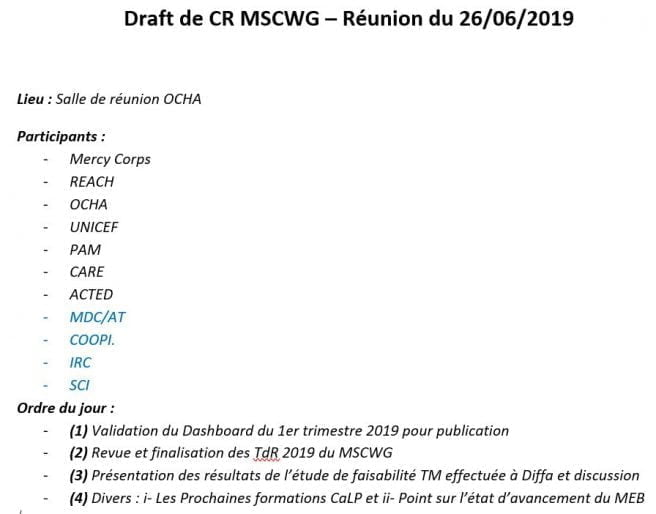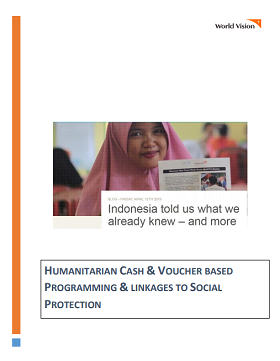Coordination
Background
Effective coordination can prevent gaps and overlaps in humanitarian responses, ensure the impact of CVA is optimised for the benefit of crisis affected populations, whilst also making the most of limited humanitarian funding. But the CALP Network’s State of the World’s Cash report found that cash coordination is seen as weak and ad hoc, and that this is having serious operational impact.
Ninety-five donors, international and national NGOs, private sector actors and one UN agency have called for clarity on two key issues surrounding cash coordination:
- Who should be accountable for ensuring effective cash coordination, and
- What the scope of Cash Working Groups should be, including in relation to multipurpose cash.
We urgently need to build on what works and provide clarity at the global level on the questions above, whilst adapting to different contexts. Clear decisions based on the impact on affected populations rather than agency politics are long overdue.
Current priorities
We aim to contribute to progress on this issue on three levels: supporting Cash Working Groups at the regional level; contributing to practical solutions for cash coordination at the global level; and convening evidence-based discussion on the key issues, highlighting critical decision points and opportunities for progress.
Featured content

Cash Coordination – LIVE timeline
Page
The latest updates on cash coordination as they unfold.

95 Organisations Sign Letter Calling for Strengthened Cash Coordination
News
Today a letter signed by 95 organisations was handed into the Emergency Relief Coordinator (ERC) urging the Inter-Agency Standing Committee (IASC) to take a decision on the leadership and scope of cash coordination in the coming year.

Is cash transforming the humanitarian system or is the system limiting how cash is used?
Blog Post
At the State of World’s Cash 2020 launch event, Sorcha O’Callaghan, Director of Humanitarian Policy Group at ODI warned that, “Cash offers a huge transformative potential, but as far as the system is privileging the interest of the agencies over people in crisis, we won’t be able to see it”. If you missed the State of the World's Cash 2020 launch we're sharing highlights. Quote 4...

State of the World’s Cash 2020 Chapter 5 summary: Coordination
Report
There has been very limited progress on cash coordination since 2017. Cash continues to challenge the established coordination and funding architecture, and efforts to resolve outstanding questions around cash coordination have failed. Despite the lack of global agreement, Cash Working Groups are pushing forward and contributing to improved programming, and generating new approaches. This...

Cash Coordination Tip Sheet
Guidelines and Tools
This tip sheet sets out established best practice, key guidance and resources for all aspects of cash coordination, intended as a clear, accessible and action-oriented guide for those engaged in coordination of cash and voucher assistance (CVA) at the field level.

Introducing the Cash Coordination Tip Sheet
Webinar
The CALP Network has developed a tipsheet setting out established best practice and key guidance and resources for all aspects of cash coordination, intended as a clear, accessible and action-oriented guide for those engaged in coordination of cash and voucher assistance at the field level.

Cash Coordination: A proposal from members in MENA
Blog Post
Earlier this year the CALP Network undertook regional consultations to explore options for cash coordination. This blog lays out recommendations from participants from the Middle East and North Africa who sketched out what cash coordination, and coordination more broadly, could look like in future to support a more effective, efficient and accountable response.
Thematic lead
Latest

Leveraging Cash and Voucher Assistance in Gender-based Violence Prevention and Response
Blog Post
Despite a reported 60% scale-up in cash and voucher delivery from 2016-18, its use for protection outcomes – including to support the prevention of and response to gender-based violence – trails behind that of all other sectors. In our latest guest blog, Tenzin Manell of Women’s Refugee Commission...

Webinar: Help shape the Future of Financial Assistance report
Event
This webinar presented the scenarios and key issues arising from the CALP Network and IARAN's analysis and invited participants' input, ahead of the publication of the Future of Financial Assistance report

A New Blueprint for the Future of Financial Assistance
Blog Post
Ahead of our workshop on the Future of Financial Assistance in Amman on 24 and 25 July, Paula Gil Baizan, independent expert and a member of the steering committee for the CALP Network’s Future of Financial Assistance work, encourages us to re-imagine the blueprint upon which we build the future of...

Compte-rendu du Cash Working Group du Niger du 31 juillet 2019
Report

Cash Coordination: A proposal from members in MENA
Blog Post
Earlier this year the CALP Network undertook regional consultations to explore options for cash coordination. This blog lays out recommendations from participants from the Middle East and North Africa who sketched out what cash coordination, and coordination more broadly, could look like in future to...

Major Humanitarian Donor Agencies Issue Joint Donor Statement on Cash
News
Senior officials from major donor agencies EU/DG ECHO, Germany, Norway, Sweden, Switzerland, the United Kingdom and the United States of America have released a 'Joint Donor Statement on Humanitarian Cash Transfers', identifying priority areas where donors can improve coordination by focusing on nine...

Highlights from Bioforce Institute Graduation Event in Dakar
Event
On Thursday 13th June 2019 the CALP Network was part of a graduation event hosted by the Bioforce Institute, one of our training partner organisations. This event celebrated the graduation of all the Bioforce students that followed the CALP Network’s CVA fundamentals course, which was delivered by our...

Compte-rendu du Cash Working Group du Niger du 26 juin 2019
Report

How Cash-Based Approaches affect Nutrition Outcomes: Case Studies from World Vision cash programmes in Bangladesh and South Sudan
Report
Case studies South Sudan & Bangladesh – analysis of how different modalities meet their basic needs with flexibility and dignity, esp. contributing to improved nutrition outcomes. Factors such as spending patterns, availability of nutritious food in markets, dietary changes & coping strategies, transfer...

How Cash-Based Approaches Affect Nutrition Outcomes – Guidence Note
Guidelines and Tools
Based on the case studies from South Sudan and Bangladesh, this summary guidance provides advise on use of CVA for improved nutrition outcomes in vulnerable children, emphasising recommendations to ensure that:
– as part of design and targeting, there is improved consideration of nutrition needs in MEB...

Cash and Crises Series Episode 2: The Role of Central Banks in Disaster Management
Video
Watch the video here Cash and Crises is a series of financial literacy audiographics brought to you by CashEssentials, a private sector initiative with a social mission to support the relief and development community in understanding how cash is managed for society in times of crisis. In Episode 2,...

Humanitarian CVA & Linkages to Social Protection – Indonesia told us what we already knew
Report
Case study highlights linkages from disaster-response MPCA in Sulawesi/ Indonesia in 2018 to Child Sensitive Social Protection Programmes – key learnings and best practise. https://www.wvi.org/stories/disaster-management/indonesia-told-us-what-we-already-knew-and-more

We Need your Help to Prepare for the Future of Financial Assistance
Blog Post
What role will financial assistance play in meeting the needs of people affected by the crises of tomorrow? Read more about why the CALP Network is launching a collaborative process to try to understand what financial assistance might look like by 2030, and to help actors adapt and prepare for the future.

Cash is no Riskier than Other Forms of Aid. So Why Do We Still Treat In-kind like the Safer Option?
Blog Post
The first in a new series of blogs on cash and voucher assistance and risk, this article from the CALP Network’s Stefan Bumbacher debunks some common myths around the risk of misappropriation and fraud in CVA.

#GenderCash: One year on from the Nairobi Gender Symposium
Blog Post
Together our members and partners have strengthened the evidence base and advanced the debate around gender and cash and voucher assistance. Looking ahead, how can we ensure we turn talk into action to deliver quality CVA for everyone?

Key Donors Publish ‘Common Donor Approach to Humanitarian Cash Programming’ – Read the statement in full here
News
Donors from Australia, Canada, Denmark, EU/DG ECHO, Germany, Norway, Sweden, Switzerland, UK and USA set out a shared vision and principles which will guide their support for cash programming, a significant step towards stronger donor coordination.

The UN Common Cash Platform: What does it mean and how is the IRC responding?
Blog Post
Together our members and partners have strengthened the evidence base and advanced the debate around gender and cash and voucher assistance. Looking ahead, how can we ensure we turn talk into action to deliver quality CVA for everyone?

Compte-rendu du Cash Working Group du Niger du 06 mars 2019
Report

Cash and Crises Series Episode I: Digital Money
Video
Cash and Crises is a series of financial literacy audiographics brought to you by CashEssentials, a private sector initiative with a social mission to support the relief and development community in understanding how cash is managed for society in times of crisis. In Episode 1, we start with a short...

Networks and Collective Action : Hard-truths and top tips
Blog Post
In this guest blog, independent humanitarian consultant and former programme coordinator for the CALP Network, Isabelle Pelly, shares her advice for leveraging the power of networks for collective action.
